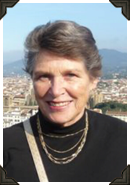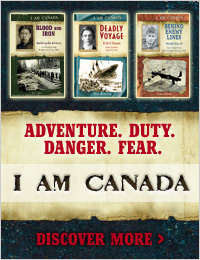Dear Canada: A step back in time
AUTHORS

Dear Reader
Because I grew up in Argentina, I never learned any history at all about Canada. For a time I went to an American school and learned American history. Then I went to a British school and learned English history. Both equally dull and boring, I thought. But I never learned anything about the country of my birth. When I came back to Canada to go to university I enrolled in an arts course—again, no history involved. It wasn't until I wanted to write a story set back in pioneer times that I realized that, like it or lump it, I was going to have to grit my teeth, do boring research, and learn boring Canadian history.
It was a great surprise to me to find that far from finding the history of our country dull, it was interesting. More than interesting, it was thrilling. I wrote that first book, called The Other Elizabeth, about the descendants of the Loyalists who settled along the St. Lawrence River in what is now Cornwall. When I was asked if I would like to write a book for the Dear Canada series I immediately thought of writing about the Loyalists themselves. Already done the research, I thought. But of course there was more to do. A lot more. With Nothing But Our Courage involved retracing the MacDonald family's footsteps from Albany, New York, up the Hudson River valley, across Lake Champlain, up the Richelieu River to Sorel and then up the St. Lawrence River to Montreal and finally Johnstown, now Cornwall. My husband, dog and I drove in luxury, but every kilometre of the way I was imagining how it must have been for them. First in their cart with what belongings they had managed to salvage, finally on foot through cold and rainy November weather.
We had many experiences while exploring the route they took — mostly good — but we left Ticonderoga in a hurry when we awoke one morning to find the town full of American Revolutionary soldiers and ladies in old-fashioned dresses. They were doing a re-enactment of the battle of Fort Ticonderoga — very useful from the point of view of my historical research, but I thought it best to leave before they found out I was a Canadian researching the "treasonous Tories." There might have been a temptation on their part to put me in the village stocks as a British spy.
When my husband retired and we moved to Owen Sound, Ontario, I learned that city had been the northern terminus of the Underground Railroad, the path escaping slaves from the American south took to reach freedom in Canada. What if, I thought, I wrote the story of one girl, Julia May Jackson, and her family, and their escape to Owen Sound? My second Dear Canada book, A Desperate Road to Freedom, began to take shape.
I could do much of the research in Owen Sound itself, but again my husband, dog and I decided to retrace the family’s flight from Virginia, during the American Civil War, into Canada. I was able to absorb the country along the way and see what kinds of problems they would have faced while trying to avoid capture. It was chilling to drive through the well-named Dismal Swamp where they hid from pursuing slave-catchers. Chilling again, a little farther on, when we explored the deserted streets of Fortress Monroe in Virginia. Deserted because the soldiers from that Fort were off fighting in yet another war, in Iraq. That fort had been called the “Freedom Fortress” by escaping slaves, because the commander of the fort at that time, General Benjamin F. Butler, refused to hand any slaves that made it there back over to the slave-catchers. It became a safe haven for many on their long, dangerous way up to Canada.
My latest Dear Canada book. A Country of Our Own, is set in Ottawa in 1866-67, at the time of Confederation, when we did, truly become a “country of our own.” Researching this book did not involve so much travelling, but it was a fascinating journey into the past of this great city. When Queen Victoria declared that it should be the capital of what was then the Province of Canada, Ottawa was a smelly, muddy, raw, lumber town. Pigs and cows roamed the streets. It was definitely not the place where young Rosie Dunn, an Irish girl who worked for a Civil Service family, wanted to be. I used to live in Ottawa and it was fun for my husband and me to go back and revisit the city. I learned so much that I hadn’t known before about the city where my eldest son was born.
Canadian history dull? Absolutely not.
Research boring? No way!



